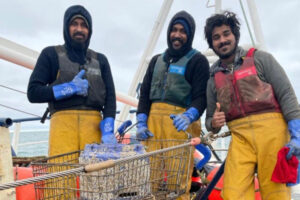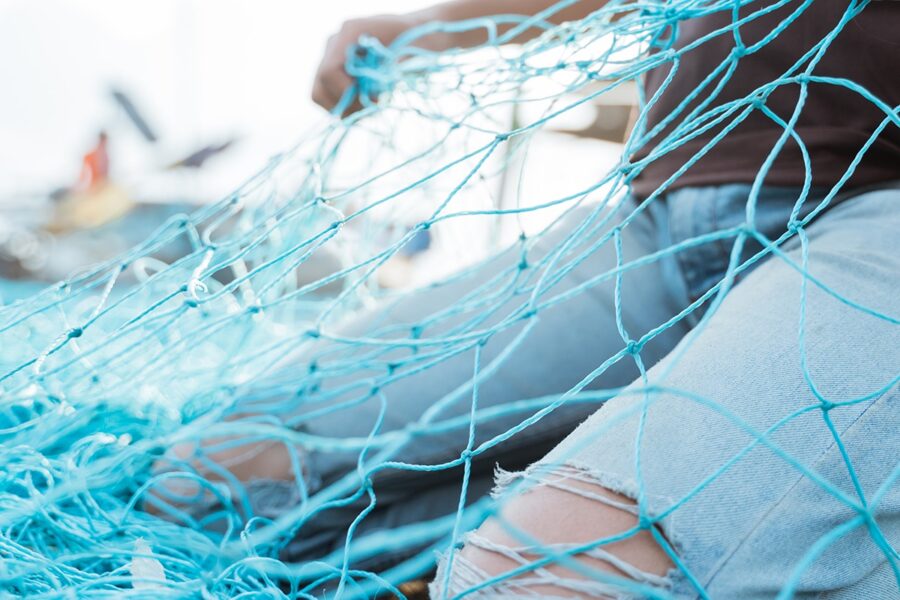The fallout from the reports released two weeks ago, detailing accusations of abuse and exploitation of foreign crew who are employed using transit visas to work on UK fishing vessels outside 12 miles, have continued, reports Andy Read.
Speaking on behalf of the UK-wide Fishermen’s Welfare Alliance (FWA), Elspeth Macdonald, chief executive of the Scottish Fishermen’s Federation, said: “It is a reality that migrant workers are a vital and likely permanent feature of parts of the UK fishing sector – much as they are in other industries and professions.
“We value the contributions these workers make to our industry, and in turn we want them to feel valued. They are skilled individuals, and fishing industry representatives worked hard for fishing crew to rightly be recognised as skilled workers in the government’s new immigration system.
“The FWA therefore unreservedly condemns the reports of abuse and exploitation that were published last week. Such behaviour is deplorable and utterly indefensible. However, it is wrong to assume that the issues raised are endemic across the UK fishing fleet – they are not, and indeed the University of Nottingham report made clear that its findings were based on a small sample that was not chosen at random, so its findings cannot be generalised.
“The UK fishing industry strives to be a modern and attractive employer. It is clear that these reports, while they represent a very small and atypical minority, undermine the credibility of this ambition. We are disappointed that, rather than working with us, the University of Nottingham and the ITF [International Transport Workers’ Federation] chose not to engage the FWA in its work, or to share the details of their research prior to its release.
“Lurid headlines leave a stain on the whole industry, regardless of the sample size and methodology used. They tar the vast majority of fishermen who are horrified by these reports with the same brush as the perpetrators of the crimes. They also serve to undermine the efforts industry is making to encourage fishers to come to the UK through the skilled worker route. We deplore ill treatment of anyone in our industry, but we also deplore the misrepresentation of our industry.
“There is a raft of strong, protective modern legislation in place in the UK fishing industry, and active and engaged regulatory bodies with powers to enforce it.
The MCA recently undertook an unannounced inspection campaign of hundreds of fishing vessels across the whole of the UK. The MCA did not raise any issues with industry concerning the working and living conditions or treatment of fishing crew.
“What the reports have done, however, is shine a light on issues that we have been raising with government for many years – that the transit visa system is flawed, and that the skilled worker route which is now available is not working. It is unfortunate that the reports did not tell the full story.
“Those parts of the fishing industry that rely on migrant crew have been seeking an alternative to the transit visa for many years now. We hope that the ITF research highlights why the fishing industry needs an alternative immigration option, and why the government must work with us to make the skilled worker route actually work.”
Similar sentiments were expressed by the Shetland Fishermen’s Association (SFA). Its executive officer Sheila Keith told Shetland News that the ‘findings in this report are not something we recognise as issues in the Shetland fleet’.
“If the findings of this report are true, they raise significant concerns for the treatment of fishermen elsewhere,” she said.
She said there is a significant difference when it comes to local fishing boats – the Shetland fleet is owned by residents rather than larger companies.
“A small percentage of fishermen in our fleet are non-Shetland residents, less than half a percent, of which there is a small number of Filipino, Ghanaian and Latvian fishermen,” she explained. “All sourced through reputable agencies, with contracts of employment. All vessels comply with the ILO 188 regulations and UK employment law.”
Sheila Keith added that most of these fishermen have been working on their current boats for many years and are ‘very settled’. “Surely that is a testament to good working experiences of foreign crews in our fleet,” she said.
“This was also backed up when the government’s Maritime and Coastguard Agency recently carried out a concentrated inspection campaign in Shetland, making unannounced visits to fishing vessels. There were no reports of problems with working or living conditions aboard.
“We of course welcome any changes to improve the working conditions for fishermen to ensure the Shetland experience is replicated elsewhere.”
‘Addressing skilled worker visa will reduce risks of abuse’

Sri Lankan fishermen (left to right) Anthony Kurukulasuriya, Shehan Chathuranga Kurukulasuriya and Charun Kurukulasuriya are working with their skipper for visas under the skilled worker scheme.
A number of skippers and trainers, speaking to FN on condition of anonymity, confirmed their perceptions that some foreign crew were not being treated ideally, making the point that moves to address the skilled worker visa, and see fishermen employed through this route, would greatly reduce the risk of future abuse.
One training provider said: “I’ve seen examples of vessels turning down applications from qualified new entrants to the industry, as they perceive employing established seamen through the transit visa route as a cheaper short-term option.
“This is really disappointing, and whilst the youngsters coming through the training system have plenty of other options available to them, it does indicate a short-term mindset by some owners that is clearly damaging the industry in the long term.”
A skipper who employs foreign crew, and has been supporting his crew through the lengthy route involved in obtaining visas via the skilled worker route, told FN: “The skilled worker route is expensive and time-consuming, but one thing it will do is reduce the risk of bad treatment of foreign crew. The route involves commitment from both the crew concerned and the vessel owner. Sponsorship guarantees a decent salary must be paid, on top of which there are agency fees, and flights to pay. It is a real investment in crew, for the longer term, and will weed out owners looking only for short-term cheap labour.
“I have also heard at first hand, from the crew I have with me, of the impacts this has had on their own family finances back home. The salaries we pay have a huge impact, often across an extended family, supporting education of children as well as provision of financial support for relatives and ageing parents.”
However, changes are needed to the skilled worker visa requirements to make them realistic for many of the suitable applicants, he said. “Whilst it is very sensible to require a level of skill in English – I have had to let go a few foreign crew in the past due to language difficulties – many good crew are quite capable of passing oral examinations, but then struggle with the long, written exam required.”
A different operator, working in the whitefish sector, told FN, again on condition of anonymity: “We are fully aware that some vessels are tainting the reputation of fishing as a whole as a bad employer. There is undoubtedly some truth in the reports that came out recently, but in my view it greatly exaggerated the number of problem boats that are out there, which are restricted to certain sectors of the fleet.
“For the majority of boats, we see crew as a long-term investment, not as a resource to be used up and replaced, and I simply don’t recognise the claims made that these abuses are widespread.”
Elspeth Macdonald agreed that the immigration system needs to work better, and that the task ahead cannot just rest with the fishing industry. She added: “The FWA is calling on government (including Defra, Home Office and MCA) to work collaboratively on this.”
She called for four steps to tackle the issue:
- A roundtable with Defra and the Home Office to address, once and for all, the issues that exist with the transit visa and to identify and implement the appropriate solutions for the catching sector to recruit the crew it needs.
- Direct engagement with MCA on the enforcement of the ILO 188 regulations and their concentrated inspection campaigns
- A meeting with the ITF, The Seafarers’ Charity and the University of Nottingham to discuss their findings, share details of the work that industry has been doing over several years, and establish what further steps may need to be taken. “There is no benefit to anyone, least of all migrant crew, from further embedding polarised perspectives on this matter,” said Ms Macdonald.
- The establishment of a forum that will bring together all parties in the supply chain to look at this as a shared problem and explore collective solutions.
Elspeth Macdonald added: “Finally, given the severity of the issues contained in these reports, we fully expect that the information has been shared with the police and other relevant authorities so that the appropriate action can be taken. We neither want nor will tolerate individuals who behave in the manner alleged in our industry.”
‘Shetland has treated us well’

Filipino crew Giovanni Lomondoc and Jan Stephen Canumay in the galley of the Shetland whitefish vessel Sharyn Louise.
Shetland-based Giovanni Lomondoc and Jan Stephen Canumay, Filipino crew currently working aboard the Sharyn Louise LK 250, have only praise for their current employers.
Thirty-four-year-old Giovanni arrived in Shetland three years ago, and started his UK career on the whitefish vessel Prolific LK 986.
“Obtaining the first contract on Prolific freed me up from working in the family shop back home, which had been a struggle. I’m able now to support my family back home, including my mother, and I regularly send back money to my wife, to support our two children.
“Shetland has treated us well. The vessels are very safety-conscious, they look after us, and another great aspect of the boat is that we have really strong WiFi included. This is especially important for foreign crews, as we use this to keep in touch with family and friends.
“We are aware that in some sections of the fishing industry – not in Shetland, where I only ever heard 100% good things from the few other foreign crew here – things are not so good. There is a turnover of crew. We hear about this only from people who are looking to join whitefish boats such as Sharyn Louise, that have such a strong reputation.”








